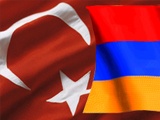|
|
TODAY.AZ / World news
Turkey ready to "temporarily open" Armenia border for NATO exercise
15 July 2010 [10:16] - TODAY.AZ
Turkey will be among the NATO and partner countries taking part in an exercise to be held in Armenia by NATO's EADRCC.
 Though normalization efforts between estranged neighbors Turkey and Armenia have stalled, Turkey will be among the NATO and partner countries taking part in an exercise to be held in Armenia by NATO's Euro-Atlantic Disaster Response Coordination Center (EADRCC).
Though normalization efforts between estranged neighbors Turkey and Armenia have stalled, Turkey will be among the NATO and partner countries taking part in an exercise to be held in Armenia by NATO's Euro-Atlantic Disaster Response Coordination Center (EADRCC).Foreign Ministry officials based in Ankara, speaking with Cihan NEws Agency on Wednesday, confirmed a media report that Turkey will participate in a disaster response exercise called “Armenia 2010.” The exercise, organized by the EADRCC as a consequence management field exercise, will take place between Sept. 11 and 17 in Armenia.
For the exercise, the border between Turkey and Armenia may be opened “temporarily,” Turkish diplomatic sources, speaking on condition of anonymity, told Cihan News Agency on Wednesday.
“During technical discussions at NATO headquarters in Brussels a while ago, when such a possibility was raised by NATO officials, the Turkish side responded favorably,” diplomatic sources said.
Yet whether the border is physically suitable for the conduct of the exercise is still in question. Nonetheless, whatever the scenario is and however the border will be used, for instance for the crossing of trucks loaded with humanitarian aid, the border will be closed again upon the end of the exercises, the same diplomatic sources highlighted.
Although Turkey was among the first countries to recognize Armenia after the ex-Soviet nation declared independence in 1991, the two neighbors have no diplomatic relations. In 1993 Turkey shut its border with Armenia in a show of solidarity with its close ally, Azerbaijan, which was at war with Armenia over the Nagorno-Karabakh enclave, dealing a heavy economic blow to the impoverished nation.
Ankara and Yerevan signed two protocols in Zurich on Oct. 10 of last year on the establishment of diplomatic relations and the development of bilateral relations between the two countries, including the opening of their common border.
However, the process hit a rocky patch in January after an Armenian court upheld the legality of the protocols but underlined that they could not contradict Yerevan's official position that the alleged Armenian genocide must be internationally recognized.
Turkey accused Yerevan of trying to set conditions on the deals. The process of normalization has also been crippled by Turkey's insistence on parallel progress on the Nagorno-Karabakh conflict between Armenia and Azerbaijan.
/World Bulletin/
URL: http://www.today.az/news/regions/70958.html
 Print version
Print version
Views: 2357
Connect with us. Get latest news and updates.
See Also
- 24 November 2025 [22:39]
Sudan’s top general rejects US-led ceasefire proposal, calling it ‘the worst yet’ - 24 November 2025 [21:15]
Egyptians vote in second phase of parliamentary elections - 24 November 2025 [20:49]
Meloni sees Trump 'willingness' on Ukraine peace plan - 24 November 2025 [20:21]
Google introduces direct file-sharing from Android to Apple devices - 24 November 2025 [09:00]
Senior Israeli officers removed from service for role in Oct. 7 security collapse - 23 November 2025 [22:24]
Face-covering headgear banned in Manila's streets - 23 November 2025 [21:38]
Dozens of children escape gunmen after 315 Abducted in Nigeria - 23 November 2025 [21:16]
US President claims he is underappreciated, says Ukraine lacks gratitude - 23 November 2025 [20:47]
Israeli strike hits Beirut, aiming at Hezbollah chief of staff - 23 November 2025 [20:19]
US boycotts G20 Summit in South Africa, leaving presidency handover in limbo
Most Popular
 Azerbaijan brings together NGOs of Turkic States for first time
Azerbaijan brings together NGOs of Turkic States for first time
 President Erdogan plans to meet his Russian counterpart to discuss Ukraine
President Erdogan plans to meet his Russian counterpart to discuss Ukraine
 ANCA recruits odious senators against Azerbaijan: Signatures for signatures' sake
ANCA recruits odious senators against Azerbaijan: Signatures for signatures' sake
 Israeli strike hits Beirut, aiming at Hezbollah chief of staff
Israeli strike hits Beirut, aiming at Hezbollah chief of staff
 Baku, Tehran exchange views on mutual interests and regional issues
Baku, Tehran exchange views on mutual interests and regional issues
 US President claims he is underappreciated, says Ukraine lacks gratitude
US President claims he is underappreciated, says Ukraine lacks gratitude
 Ninety arrested at London rally backing banned Palestine Action group
Ninety arrested at London rally backing banned Palestine Action group
